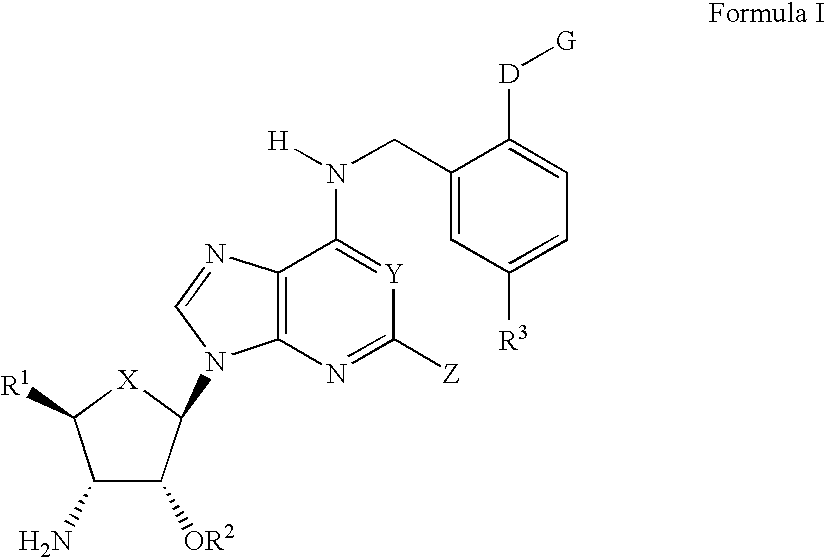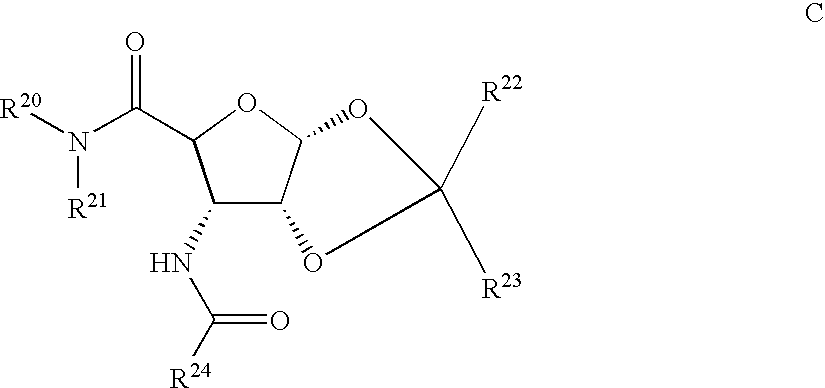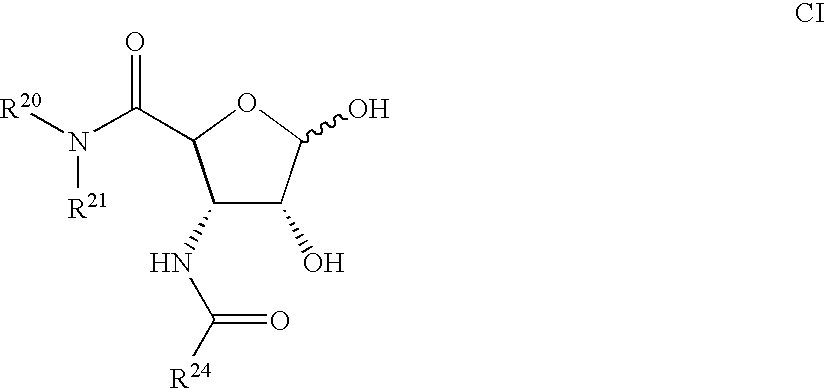Compounds for the treatment of ischemia
a technology of ischemia and compound, which is applied in the field of compound for the treatment of ischemia, can solve the problems of sudden death, myocardial infarction or congestive heart failure, ischemic/hypoxic damage,
- Summary
- Abstract
- Description
- Claims
- Application Information
AI Technical Summary
Problems solved by technology
Method used
Image
Examples
example 2
Acetonide Cleavage
[0698] (2S,3S,4R,5R)3-Amino-5-{6-[5-chloro-2-(3,4,5,6-tetrahydroxytetrahyd-ropyran-2-ylmethoxy)benzylamino]-purin-9-yl}-4-hydroxytetrahydrofuran-2-ca-rboxylic acid methyl amide.
[0699] To a solution of 3-amino-5-{-6-[5-chloro-2-(2,2,7,7-tetramethyltetr-ahydro-bis[1,3]dioxolo[4,5-b;4',5'-d]pyran-5-ylmethoxy) benzylamino]purin-9-yl}-4-hydroxytetrahydrofuran-2-carboxylic acid methylamide (59 mg, 0.09 mmol) in chloroform (7 mL) was added trifluoroacetic acid (0.7 mL). This reaction was stirred under anhydrous conditions at room temperature for 2 h. After this time period water was added (10 mL) and the reaction was stirred at room temperature for 5 days. The solvent was removed with a rotary evaporator and the resulting solid was then triturated with Et.sub.2O to afford the title compound as a beige powder
[0700] (60 mg). Mp 212.0-218.0.degree. C. C.sub.24H.sub.30ClN.sub.7O.sub.9-. MW 596.00. MS 596.1 (M+H).sup.+.
[0701] .sup.1H NMR (400 MHz, DMSO-d.sub.6) .delta. 8.52-8....
example 3
Reduction of Azide
[0702] (2S,3S,4R,5R)3-Amino-5-[6-(2-benzyloxy-5-chloro-benzylamino)-purin--9-yl]-4-hydroxytetrahydrofuran-2-carboxylic acid methylamide.
[0703] (2S,3S,4R,5R)-3-Azido-5-[6-(2-benzyloxy-5-chloro-benzylamino)-purin--9-yl-4-hydroxy tetrahydrofuran-2-carboxylic acid methyl amide (456 mg, 0.83 mmol) was dissolved in anhydrous THF (50 mL) and the reaction cooled to 0.degree. C. After adding triphenylphosphine (304 mg, 1.2 mmol), the reaction was stirred for 30 minutes at 0.degree. C. At the end of this time period, concentrated ammonium hydroxide (0.4 mL) and water (0.5 mL) were added and the reaction was allowed to slowly come to room temperature and stirred at room temperature for 15 h. The solvent was then removed by rotary evaporation and the product was preadsorbed onto silica gel and purified by flash chromatography (SiO.sub.2, 5% then 18% methanol / CH.sub.2Cl.sub.2) to afford the title compound as a colorless solid.
[0704] Mp 114.2-115.2.degree. C.
[0705] [.alpha.].sub...
example 4
[0709] (2S,3S,4R,5R)3-Amino-5-{6-[5-chloro-2-(2-morpholin-4-yl-ethoxy)-ben-zylamino]-purin-9-yl}-4-hydroxytetrahydrofuran-2-carboxylic acid methylamide.
[0710] Mp 99.0-108.0.degree. C.
[0711] [.alpha.].sub.22=-29.64.degree. (c=0.280, MeOH)
[0712] C.sub.24H.sub.31ClN.sub.8O.sub.5. MW 547.02. MS 547.2 (M+H).sup.+.
[0713] .sup.1H NMR (400 MHz, DMSO-d.sub.6) .delta. 8.57 (s, 1H); 8.45 (quart, 1H, J=4.6 Hz); 8.28 (bs, 1H); 8.21 (s, 1H); 7.22 (dd, 1H, J=8.7 Hz, J=2.4 Hz); 7.05 (bs, 1H); 7.01 (d, 1H, J=8.7 Hz); 6.02 (d, 1H, J=3.7 Hz), 6.05-5.80 (mult, 1H); 4.63 (bs, 2H); 4.40-4.30 (mult, 1H); 4.12 (t, 3H. J=5.5 Hz); 3.55-3.50 (mult, 5H); 2.70-2.60 (mult, 5H); 2.55-2.45 (mult, 4H); 2.25-1.95 (mult, 2H).
PUM
| Property | Measurement | Unit |
|---|---|---|
| Time | aaaaa | aaaaa |
| Time | aaaaa | aaaaa |
| Time | aaaaa | aaaaa |
Abstract
Description
Claims
Application Information
 Login to View More
Login to View More - R&D
- Intellectual Property
- Life Sciences
- Materials
- Tech Scout
- Unparalleled Data Quality
- Higher Quality Content
- 60% Fewer Hallucinations
Browse by: Latest US Patents, China's latest patents, Technical Efficacy Thesaurus, Application Domain, Technology Topic, Popular Technical Reports.
© 2025 PatSnap. All rights reserved.Legal|Privacy policy|Modern Slavery Act Transparency Statement|Sitemap|About US| Contact US: help@patsnap.com



